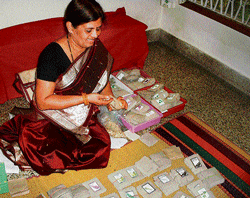According to Food and Agriculture Organization data, only 9 per cent of rural Indian women own land, although 79 per cent contribute as agricultural workers (NSSO, 2011). Where women do have some access to land, they either do not have proper titles, also known as ‘pattas’, or own it along with male family members. And this only means that invariably it’s the men who control and make decisions regarding the land.
When it comes to agricultural wages, the disparity is glaring. Women farm labourers earn only around Rs 68.94 daily while the men get Rs 101.53 (NSSO, 2011). Although men work for lesser hours, their wage is higher because they perform tougher tasks such as ploughing.
Nisha Agrawal, CEO, Oxfam India, underlined this very bias at a recent workshop on women’s land rights and agriculture organised by Landesa/Rural Development Institute and Oxfam. She pointed out that “women are undervalued in society despite their efforts and success in agricultural production that may be equal, or even better than their male counterparts.”
No one understands this reality better than Yashodha P, convener of Karnataka Dalita Mahila Vedike (KDMV), a forum of Dalit women leaders that has been striving for the rights of Dalit women in Karnataka. According to her, women rarely own fertile land and, even if they do, they face innumerable problems in securing relevant titles.
Fortunately, women farmers are no longer ready to take such discrimination lying down and helping them are organisations like Landesa/Rural Development Institute, which is partnering with state governments and local NGOs in four states - Andhra Pradesh, Karnataka, Odisha and West Bengal – to develop policies that allow poor women to lease farmland. The aim is to ensure the inclusion of women’s names on land titles and provide micro-plots to landless families. They also work with local communities to ensure that women can access land-related legal aid programmes, in order to create local centres for women’s land rights.
Besides Landesa, there are many local women’s collectives in Karnataka that are laying the ground for more than just land rights by conducting awareness drives for women to understand their basic entitlements. Yashoda’s KDMV, set up in 2007-08, is active in over 20 districts and reaches out to more than 20,000 women through leaders and volunteers at the village, block and district levels.
Remarks Yashodha, “A Karnataka legislation states that Dalits with two acres of land will get subsidised seeds and loans from the government. But Dalits and women rarely own fertile agricultural land. The government must be pragmatic while framing policies and ensure and monitor their implementation.”
“We have grown from being labourers in stone quarries and agricultural lands into becoming farmers practicing chemical-free agriculture. The government and society now respect our suggestions unlike earlier,” shares Kalamma, a member of the Grameena Mahila Okkuta in Kolar district.
The Okkuta has 400 village-level groups across 400 villages in four taluks - Srinivasapura, Mulbagal, Kolar and Bangarpet. Launched in 1994 and formalised in 1997 it has 7,000 members most of whom are barely literate Dalits. It runs seed banks, restores water tanks besides tackling other social problems.
In the Malnad region of north Karnataka, amazing work is being done by a group of small women farmers from various villages in Sirsi taluk of Uttara Kannada district. Vanastree, meaning “women of the forest”, and has around 150 members practising sustainable agriculture. These women meet once a month to buy or exchange seeds. They discuss their problems and successes in cultivation.
Vanastree encourages biodiversity in farms and home gardens whether it is natural or otherwise. It also advocates for sustainable livelihoods and food security by conserving and distributing traditional varieties of seeds and crops.
Says Sunita Rao, the founder of Vanastree, “ We want to promote home gardening. We organise a Malnad Mela in Bangalore every year to selling seeds and organic agricultural produce.”
Manorama Joshi, 49, is a small organic farmer who has been associated with Vanastree for around a decade. She reveals, “While members in the larger collective get together on a monthly basis, groups of about 20 women from nearby villages convene with greater frequency to talk about their agricultural work. Some of them also discuss personal issues.”
Farm labour has become expensive, economic challenges keep cropping up. The youth in the area no longer want to work on farms.
But Manorama and her colleagues keep going. She argues that if women are assured at least a partial share in the land and its returns, even if the title deed is in the name of the man, things would work out better.
